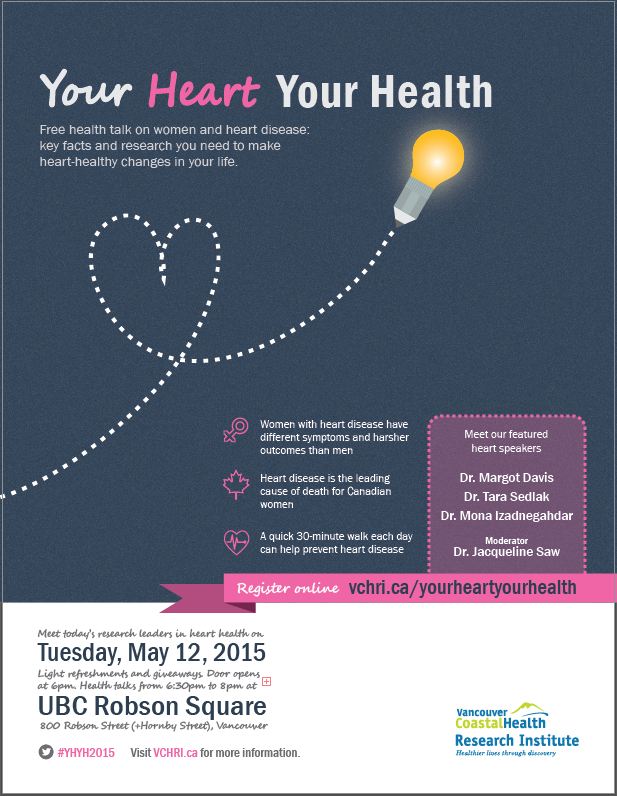
Public health talk aims to improve heart health for women by increasing awareness.
Even though heart disease is perceived as a ‘man’s’ health concern, each year in Canada more women die from heart disease than breast cancer. In 2011, Statistics Canada reported that more than 22,000 women died due to heart disease, compared to 4,958 deaths due to breast cancer. According to research by Dr. Mona Izadnegahdar, an epidemiologist with the BC Centre for Improved Cardiovascular Health, women are at significantly higher risk of dying and poorer recovery than men after a heart attack and, surprisingly, this gap between the sexes is particularly noticeable among adults younger than 55.

“Even health professionals have been surprised to learn that younger women are more likely to die following heart attack and that their clinical and health-related quality of life outcomes are worse than younger men,” says Dr. Izadnegahdar, whose cardiovascular research has involved Vancouver Coastal Health Research Institute (VCHRI).
“Our hope is that when people become aware that this impacts women of all ages, including younger women so greatly, they feel encouraged to learn about their risk factors and family history and take care of their hearts through healthy lifestyle choices such as exercising and eating healthy every day.”
Dr. Izadnegahdar will be speaking at the upcoming Your Heart Your Health event on May 12, hosted by VCHRI. Your Heart Your Health is a free health talk about women and heart disease, and offers an opportunity for women to meet and ask questions of research leaders in heart health.
A 2013 study by Dr. Izadnegahdar showed that in B.C. between 2000 and 2009, rates of hospitalization for heart attack declined significantly among both women and men except, however, among younger women specifically between 20 and 55 years of age. The study, published in the Journal of Women’s Health, showed that the rate of hospitalization for young women actually increased by 18 per cent over the 10-year study period. Study findings also showed that following their heart attack, younger women experienced an excess risk of mortality, even in the most recent years.
Dr. Izadnegahdar’s current work looking at younger men and women in B.C. and their recovery one year after a heart attack suggests that younger men reach the same level of physical health as the general population within the one year period, unlike their female counterparts. Younger women show much poorer physical and emotional health and had poorer quality of life as compared to younger male patients and women in the general population one year after heart attack.

“While there may be different clinical reasons for this, we’re also perhaps more interested in psychosocial aspects such as depression and stress,” says Dr. Izadnegahdar. “For example, there exists evidence that depression impacts outcomes after heart disease and we know that younger women tend to have higher rates of depression than men. And when we talk to the patients in our study, it is evident that younger women are generally a population that feels quite stressed because they’re often taking care of their families, children, parents, and work.”
“All of this added stress may make younger women unable to have good health behaviours that would reduce their risks.”
Women’s signs of heart attack show a wider range of symptoms as compared to men
While the main symptom of a heart attack for both men and women remains chest discomfort (i.e. chest pressure, squeezing, pain, and heaviness), additional symptoms such as discomfort in the neck, jaw, shoulder, back, and arms, are more likely to be seen in women. Shortness of breath, sweating, fever, and/or light-headedness, can also be present in both men and women.
Major risk factors for heart disease among both women and men are smoking, high blood pressure, high cholesterol, diabetes, and physical inactivity.
“Small lifestyle changes, such as going for a 10-minute walk, three times a day, 5 days a week, can make a difference, as well as reducing your intake of salty and trans fat foods” says Dr. Izadnegahdar. “The change that will have a significant impact though, particularly among younger adults, is smoking cessation.”
“Your Heart Your Health provides an important opportunity for raising such awareness and in fact, I encourage men to participate because they’re also affected by women’s heart health issues in their families,” she adds.
“Hopefully we will see a variety of people attend – it’ll be a great source of information for everyone.”



